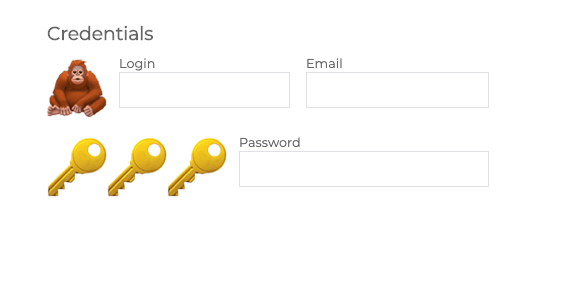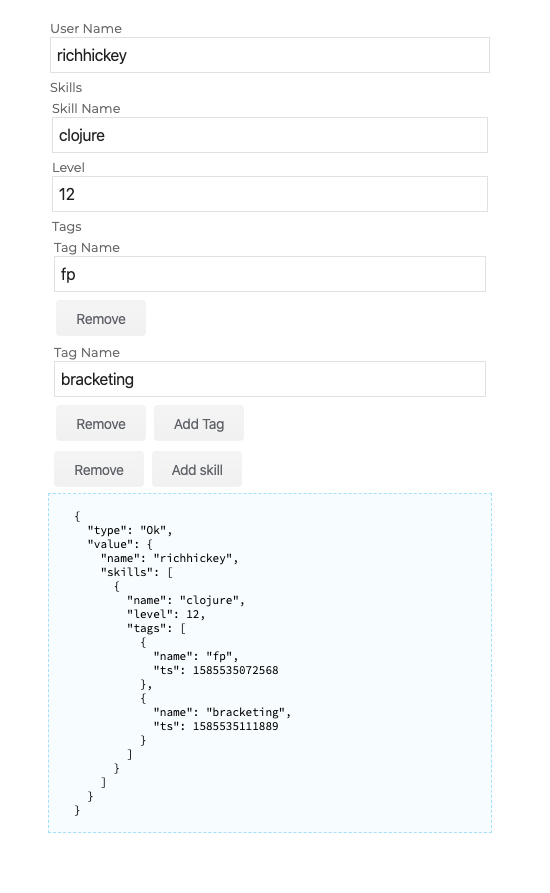The way you deal with forms depends on the way you think about the data.
This library employs advanced typescript types to automatically generate forms even
from quite complex data structures (defined by type and schema).
You can now focus on data structures only.
npm i @react-formless/core @react-formless/utils
Check out simple form example below, more complex one may be found in examples folder (online version may be found on https://gmoskal.github.io/react-formless)
import * as React from "react"
import { FormView, useFormHook, FormSchema } from "@react-formless/core"
import { validNumber } from "@react-formless/utils"
export type User = { name: string; password: string; age: number; bio: string }
const schema: FormSchema<User> = {
name: { type: "text", placeholder: "Name ...", name: "Name", id: "name" },
password: { type: "password", placeholder: "Password ...", name: "Password" },
age: { type: "number", placeholder: "Age ...", name: "Age", validators: validNumber },
bio: { type: "textarea", placeholder: "Bio...", name: "Biography" }
}
export const InputsForms: React.FC = () => {
const { formViewProps: p, result } = useFormHook({ schema })
return (
<>
<FormView {...p} />
<h3>Result</h3>
<pre>{JSON.stringify(result, null, 2)}</pre>
<h3>State</h3>
<pre>{JSON.stringify(p.state, null, 2)}</pre>
</>
)
}it renders to
Whenever custom shape of the form is needed, an extended version of <FormView> component may be used. <StyledFormView> allows us to control the presentation layer of the form.
Check out the example:
import * as React from "react"
import { useFormHook, FormSchema, StyledFormSchema, StyledFormView } from "@react-formless/core"
type Address = { name: string; street: string; postal: string; city: string }
type User = Address & { login: string; email: string; password: string; bio: string }
const schema: FormSchema<User> = {
login: { name: "Login", type: "text", id: "name" },
email: { name: "Email", type: "text", readOnly: true },
password: { name: "Password", type: "password" },
name: { name: "Name", type: "text" },
street: { name: "Street", type: "text" },
city: { name: "Street", type: "text" },
postal: { name: "Postal", type: "text" },
bio: { name: "Bio", type: "textarea", placeholder: "Bio" }
}
export const styledSchema: StyledFormSchema<User> = [
{ type: "Title", value: "Basic info" },
{
type: "Row",
value: ["login", "email", "password"]
},
{ type: "Title", value: "Address" },
{ type: "Row", value: ["name", "street", "postal", "city"] },
{ type: "Title", value: "Additional" },
"bio"
]
export const LayoutForm: React.FC = () => {
const { formViewProps: p } = useFormHook({ schema })
return <StyledFormView {...p} styledSchema={styledSchema} />
}it renders to
Moreover whenever custom element is needed, we may use define CustomFields and pass Custom to styledInputsRenderMap
type User = { login: string; email: string; password: string }
const schema: FormSchema<User> = {
login: { name: "Login", type: "text", id: "name" },
email: { name: "Email", type: "text", readOnly: true },
password: { name: "Password", type: "password" }
}
type CustomFields = { type: "emoji"; text: string; repeat?: number }
export const styledSchema: StyledFormSchema<User, CustomFields> = [
{ type: "Title", value: "Credentials" },
{
type: "Row",
value: [{ type: "Custom", value: { type: "emoji", text: "🦧" } }, "login", "email"]
},
{
type: "Row",
value: [{ type: "Custom", value: { type: "emoji", text: "🔑", repeat: 3 } }, "password"]
}
]
const Custom: React.FC<{ value: CustomFields }> = p => (
<span style={{ fontSize: "60px", marginRight: "10px" }}>{p.value.text.repeat(p.value.repeat || 1)}</span>
)
export const LayoutForm: React.FC = () => {
const { formViewProps } = useFormHook({ schema })
return <StyledFormView {...formViewProps} styledSchema={styledSchema} styledInputsRenderMap={{ Custom }} />
}it renders to
Formless comes with default collection support, so whenever you want to create nested collections and you still want it to be strongly typed formless is a good match.
Check out the complex example where each User has collection of Skills and each skill has collection of Tags.
import * as React from "react"
import { FormView, useFormHook, toResult, FormSchema } from "@react-formless/core"
type User = { name: string; skills: Skill[] }
type Skill = { name: string; level: number; tags: Tag[] }
type Tag = { name: string; ts: number }
const skillSchema: FormSchema<Skill> = {
name: { name: "Skill Name", type: "text" },
level: { name: "Level", type: "number" },
tags: {
name: "Tags",
type: "collection",
mutate: { addNextLabel: "Add Tag", createValue: () => ({ name: "", ts: new Date().getTime() }) },
fields: { name: { name: "Tag Name", type: "text" }, ts: { type: "hidden" } }
}
}
const userSchema: FormSchema<User> = {
name: { name: "User Name", type: "text" },
skills: {
name: "Skills",
type: "collection",
mutate: { addNextLabel: "Add skill", createValue: () => ({ name: "", level: 0, tags: [] }) },
fields: skillSchema
}
}
export const InputCollectionForm: React.FC = () => {
const { formViewProps: p, result } = useFormHook({ schema: userSchema })
return (
<>
<FormView {...p} />
<pre>{JSON.stringify(result, null, 2)}</pre>
</>
)
}it renders to
When it comes to rendering Formless supports render maps. Render map is an object that describes how each supported input type should be rendered.
The easiest example is like:
export const CustomInputsForms: React.FC = () => {
const { formViewProps: p } = useFormHook({ schema })
const customRenderMap: Partial<InputRenderMap> = {
text: rp => <h1>Readonly text {rp.state.value}</h1>,
password: rp => <h2>Readonly password {rp.state.value}</h2>
}
return <FormView {...p} customRenderMap={customRenderMap} />
}That will render each text input and password input as an readonly <h1> and <h2> tag.
Ant-design and react-95 rendering may be installed using (both are a bit rough)
npm i @react-formless/antd @react-formless/react95Checkout more complex exmaples on https://gmoskal.github.io/react-formless under custom renderes section.
To compile and run project's examples, clone this repo and type
yarn
yarn build
yarn workspace @react-formless/examples startexample project should be running on http://localhost:1234
You may check running online version here
More documentation comming soon



